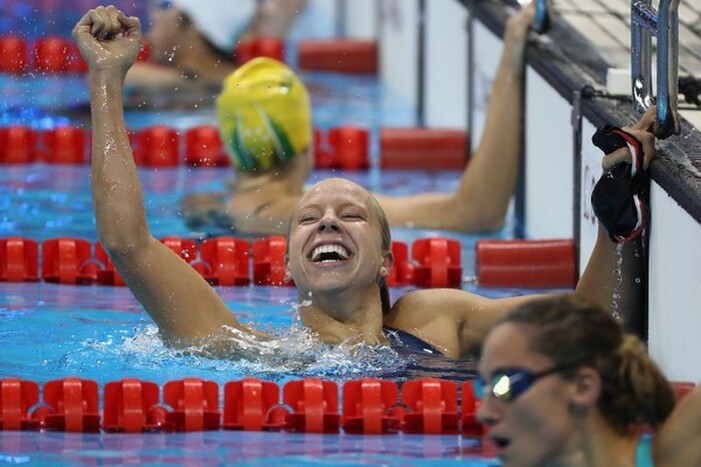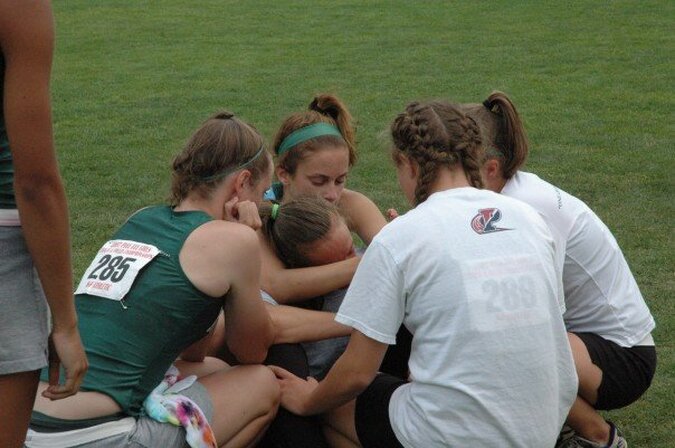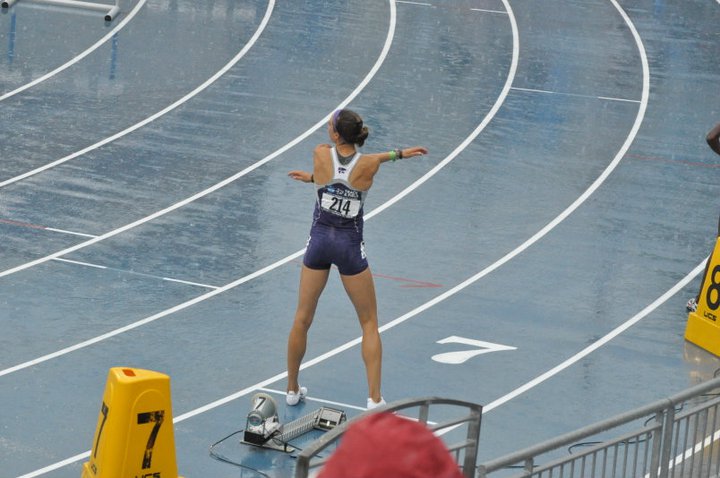|
According to the Harvard School of Public Health, 73% of adults have participated in sports at some point. 89% of parents claim to have a child benefitting from sport participation. From recreational player to Olympic medalist, sports leave a lasting impact on our lives. Even if you’ve never stepped foot into an athletic arena, my bet is that you are only one degree of separation away. Are you the parent of an athlete? Are you married to a sports fan? It’s undeniable, sports infiltrate our culture.  That being said, have you ever considered how sports impact your quest for health and wellness? Have you actually thought about why you sign your kids up for sports? As a former elite athlete and a current Wellness Coach, Health-seeker, and Mother of kids who will try sports at some point, I’m eager to bring to light all the strengths we can take from sports.My hope is that you recognize these strengths, maybe even have an “ah-hah” moment, and feel empowered to confidently transfer these strengths into your daily life. So, health-seeker, join me in exploring the lifelong benefits of sports, as well as an eye-opening component that we need to leave behind. 1. Emotional Exposure and ExpressionSports take us through a roller coaster of emotions. INTENSE EMOTIONS. An athlete may never experience the same degree of elation or disappointment as a hard-fought victory or defeat. Why? Because when you're pushing your body to extremes for the sake of a bigger purpose (your team), you have a lot on the line. Passion runs high in the sports arena. Where passion is high, emotions are strong. Not only do sports amplify emotions, they also expose the athlete to a wide variety of emotions. What does this look like? Sports present a lot of variables, scenarios, and a complicated interdependence of people who operate in wonderfully different ways. This undoubtedly leads to the stirring of different personal emotions. Maybe you threw an interception. Maybe you didn’t meet your coach's expectations. Or maybe a teammate praised your efforts. Maybe the stadium is silent as you prepare for the outcome-changing penalty kick with 1 minute left in the game. EMOTIONS. What’s so special about sports and emotions? Why does this matter to the health-seeker? Sports love emotional expression! Where else is it socially acceptable to burst into tears or flip your shirt over your head and run around with airplane arms?! Most likely, not in the office or at your piano recital. Sports don’t ask you to suppress your emotions like the majority of us have learned to do. In fact, sports say “Feel it. Feel it now. Recognize it. Name it. Go ahead and express it. Then, and only then, come back down to centered, focused, and ready to move forward.” We can learn from this and apply it! How many times have you pushed down an emotion? Has this repeated process escalated into depression, anxiety, emotional explosions, or even emotional numbness? Repeated emotional suppression can even negatively impact your physiology (blood pressure, muscular tightness and pain, etc.). Think about a situation that has stirred up an intense emotion. Now imagine that you are on the sports field. How would you display it? Feel that emotion! Name it! Express it! Then re-center, re-focus, and get back in the moment. 2. Trusting the Process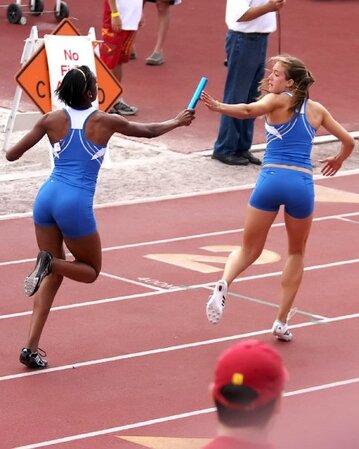 In my humble opinion, the number one way to lose your way in sports is to get too consumed in the final results. That’s why coaches preach “trust the process.” Obsessing over outcomes can lead to perfectionism, a sense of being overwhelmed, doubt, and disappointment. Health is no different. If we get caught putting all our stock in the results, it becomes exponentially more difficult to accomplish positive change. Let’s use weight as an example. A common mistake is to focus too hard on the result (the number on the scale). The more emphasis you put on the scale, the more you think about it, the more unrealistic restrictions you put on yourself, the more you crave those restrictions, the more difficult weight loss becomes. Vicious cycle. Focusing on the process, on the other hand, is all about identifying the steps required to meet your goal. The process involves taking baby step after baby step and enjoying each victory. You are driven by the positive reinforcement of accomplishment. For a sedentary person, this may look like adding 5 minutes of walking to your day (maybe even just putting your shoes on), and slowly, week by week, working your way up to 30 minutes. Another process goal would be adding vegetables to a meal, and then maybe a few meals a day, and then removing a processed item, and so on. Small steps feel more manageable and bring on a lot more confidence. When something doesn’t work, you have the power to make small (but meaningful) changes because the process is fluid (not rigid, like a result). So how does your sports background help you to be able to focus on the process? Sports require skill. Skill development, at any level, occurs one movement at a time. A good coach doesn’t give you ten different pieces of feedback after a practice rep. They break it down, starting at the simplest, most effective item. One building block after another, the athlete eventually develops the technical map required for proper execution. Concentrating on the process is what leads to the ultimate result. On a bigger scale, each season (even each career), has a series of progressions. An athlete does different types of training sessions depending on the peak of their season. These different modalities of training build upon each other. Frequently, you start at high volume in order to build a base. Then you progress to higher intensity (which can only be handled because of the volume preparation). Appropriately executing each phase of training is necessary to eventually reach top results. Getting ahead of yourself actually damages the next phase. The process itself may not translate exactly from athletics to wellness, but the concept does. Your head cannot be consumed by the end results. Executing the here and now is what allows you to progress to that ultimate goal. 3. Listening to your Body’s Needs 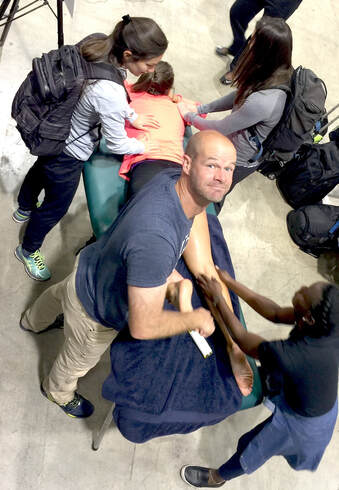 Sports require peak physical performance. It’s like wellness under a microscope. When something is off (fatigue, injury, or mental state), it will be exposed on the athletic field. Therefore, sports teach us to be sensitive to the needs of our body.
In most other realms, a person can get away with unhealthy habits for a certain period of time before experiencing the consequences. If the unhealthy habit is convenient, our nature tells us to keep doing it as long as we can get away with it. Sports aren’t that forgiving (which is a good thing), so you have to pay attention. You have to listen to the requests of your body. If you don’t, your performance suffers quickly. Health-seeker, do you feel stuck in a rut? Maybe you are experiencing an ache or pain. Maybe you are exhausted from the stress of life, or lack of sleep, or highly processed diet. Stop and listen. Approach your body like an athlete would. Have you given yourself the T.L.C. needed to sprint, jump, kick, throw, or swing at peak speed and power? What do you need to do to get it there? Although it’s true that if you are retired from sports, you really don’t need peak speed and power. What you do want is optimal performance for your current pursuits, whether it be career or caring for family, etc. When you settle for unhealthy habits over and over again because the consequence isn’t immediately glaring you in the face like it does with sports, you are chipping away from your optimal quality of life. That is a serious matter. So stop, listen, and make the kind choice for your body’s needs. 4. The Undeniable Depth of Relationships Nothing says “you can’t do it alone” like sports. Teammates. Coaches. Medical Staff. Managers. Everyone is united under the same mission. Now that is grounds for deep connection. Whether it’s a team sport or an individual sport, an athlete depends on their support system. For example, if a player is injured, another player must cover for them. The medical staff must help the player restore health. The coach must adjust training and team dynamics. Teammates must work to encourage, include, and motivate the injured player. Every person is intertwined within the network, and they function together in order to keep the unit progressing. This mutual vulnerability leads to friendships, mentorships, and lifelong impact. Without each other, the mission is in vain. Dependence isn’t the only unifying factor. The team shares similar priorities and mindsets. Quite simply, they spend a lot of time together and they enjoy what they’re doing. Study after study reveals that deep relationships are a major contributor to health, happiness, and longevity. As any Health and Wellness Coach will tell you, having a support system significantly increases your chances of making positive change, thanks to encouragement and accountability. So how does athletic participation help with deep relationships outside of the arena? Well, sports set the standard for support. If you’ve experienced it once, you know what it takes to recreate the deep relationships that pick you up and propel you forward. Specifically, think back to the codependence, vulnerability, shared values, and time spent together. Reflect on that special bond formed between you and your teammates. Developing deep relationships can be challenging as an adult health-seeker, but if you’ve had experience with sport, you know what it feels like to be deeply invested in each other. You know the factors that strengthen those bonds. Now you have the opportunity to brainstorm ways to replicate that. 5. Adapting and Overcoming Resilience is the ability to adapt to adversity (American Psychological Association, 2014). Developing resilience is a skill. When we think of sports, we readily recognize that physical training is involved. However, Sports have another whole component to them. It’s often referred to as the “soft side” of sport, and it’s all about resilience development. Whether it’s intentionally addressed or not, athletics force the participant to face adversity head on. From adverse weather to an unexpected play, there is no way around adversity. I could even argue that sport is the physical expression of constantly overcoming adversity. Overcoming adversity requires catching your thoughts and choosing the helpful perspective. Information is received through your senses. Your brain forms a story. Your body reacts to the story. Resilience is being able to capture the story. When adversity is involved, the skillful aspect of thought-capturing is the speed of reframing those thoughts in a positive manner. Sports provide the opportunity to practice this skill over and over again. They also expose you to a variety of different contexts in which you have to rely on resilience. In the middle of a race, what do you do when your legs start developing lactic acid? The temptation is to give up, but resilience says “I’ve felt this before and I know I can keep pushing forward.” When it starts to pour down rain in the middle of your game, the temptation is to think “oh, great. Now I’m going to slip.” Resilience says “I’m prepared. I’ve practiced in the rain before.” Health-seeker, we need resilience in our daily lives too. Mental resilience, or the ability to positively shift our perspective, is one of the most powerful tools used to unlock healthy behavior change including stress reduction. Did you slip up on your goal? Resilience allows you to move past the stress of defeat. It helps you embrace flexibility and get back on track. Emotional awareness is easy to attain on a sunny summer day, but what about when you are in the heat of the moment in adverse conditions? Can you still recognize your negative emotion and shift to the useful thoughts that give you the strategies to move forward? If not, the burden of adversity gets heavier and heavier. Our first child spent 5 days in the NICU before we could bring her home from the hospital. As we drove home, I remember my husband saying “aren’t you grateful we’ve done so much training in resilience?” Absolutely I was! Every sporting failure and subsequent lesson learned caused me to develop the resilience strategies that I used when my child was carted off to the NICU. I am thankful for the coaches who held me accountable to developing these strategies every day. Little did I know then how much they would pay off. While in the NICU…Were we afraid? YES. Were we sad? YES. Were we angry? YES. Having accepted those emotions, we chose to take on the mindset of gratitude. We were grateful for a medical team that knew how to help. We chose to place our energy into the form of trust. That is resilience. We chose to focus on every piece of good news. When we were assured that she would be just fine, we chose to spend the remainder of our hospital time learning from the nurses who were expert diaper-changers, schedule-setters, and bath-givers. I tell this story to illustrate an emotional situation where we had to intentionally choose the perspective we would adopt…Despair or hope. Resilience doesn’t mean ignoring difficult emotions. It means accepting and embracing those emotions and choosing to move forward with the behaviors that align with your mission. Adapting and overcoming. Current/former athletes, whether you recognize it or not, you have lots of repetition building resilience. Have you been tapping into this power? Have you been using your skillset to adapt and overcome the stressors of life? LOOK OUT: “Work Harder Mentality” & Laser Focus While I am a proponent for the character building that happens through sport, I’ll be the first to admit that there are certain philosophies floating around the sports culture that can adversely impact our wellness journey. Taking a moment to consider whether we are hanging onto these philosophies is the first step in changing them. It would be neglectful to speak solely about the positive carry-overs of sports without providing a warning about the negative consequence of unchecked sporty mentalities. Athletes are known for being hard workers with laser focus. That’s cool, but we’ve taken it too far.
For short periods, this mentality is motivating, but it’s not sustainable. At some point, the “work harder, be more disciplined” mentality stops paying dividends. It’s definitely not sustainable for the health-seeker either. Just like we graduate from Algebra to Calculus, we also have to graduate from working harder to working smarter. Our culture loves to credit the “work harder” mindset with being the key to success. In reality, it’s the key to over-training, injury, and burn-out. Hard work is extremely valuable. Dedication and focus are extremely valuable. HOWEVER, They become harmful when they are the solution to everything. You can’t use a hammer to fix every problem. You need the right tool for that specific job. You under-performed? Work harder. Cut out all distractions. Oh, you under-performed again? Work even harder. Isolate yourself and be more rigid. This is extremely dangerous, and it’s shockingly easy to get caught up in it because our culture praises it. How many sports movies tell this story? But just like health, athletic performance necessitates balance. Repeated high performance requires mental, physical, and spiritual wellness. This is just not possible when the only strategy is to work and focus harder, harder, harder. But here’s what does work: Work, Rest, Recalibrate, Work, Rest, Recalibrate. Truly successful athletes have this mastered. They know when to work and focus, but they also rest well. During those phases of rest, they debrief and assess how to move forward during the next cycle of hard work. The public doesn’t see this side because it’s not the glamorous, exciting story that we want to be entertained by. This lack of proper representation reinforces this damaging mentality. Ultimately, here’s what I want to clear up: working yourself into the ground is NOT the key to success. Rigidly eliminating everything that is not directly related to your goal is NOT the key to success. This may sound obvious, but it's a common trap for health-seekers. Have you ever completely bailed on a nutrition goal because of one little cookie? Or maybe you gave up on exercise because of one missed workout? Maybe you are caught up in being overly disciplined? Have you ever been so tired that you couldn’t focus? Or maybe you’ve overloaded your schedule so much that you are now miserable? These all could be examples of getting caught in “work harder mentality”. Life is not black or white. It’s not all-or-nothing. Life, athletics, health, wellness… they work best in the gray area. Work hard, be disciplined, but don’t overdo it. Flexibility, adaptability, and enjoyment are just as important! The Homestretch You cannot leave athletics as an unchanged person. While there are some mindsets that need to be addressed and discarded, sports leave lasting positive impacts on us. With intentionality, the strengths we develop through sports can be translated into our health and wellness journey.
Sports give us a lot, but it can all be negatively overshadowed by extremism. Hard work has limits. Sports tempt us to get caught up in the lie that working harder is the solution to all our problems. As a health-seeker, I implore you to examine this. Has this mindset led you into perfectionism and all-or-nothing thinking? If so, ditch it, because health and wellness is not black and white. It’s about striking a beautiful balance. I leave you with the words of a famous decathlete. “The Spirit of Sports: The spirit of sports gives each of us who participate an opportunity to be creative. Sports knows no sex, age, race or religion. Sports gives us all the ability to test ourselves mentally, physically and emotionally in a way no other aspect of life can.” –Dan O’Brien Connect with Ryann or any one of our amazing board-certified coaches and start living your best life.
7 Comments
Jeralyn
3/10/2021 01:24:13 pm
Great article, Ryann! I love all the crossover between sports and health!
Reply
Ryann
3/10/2021 03:47:35 pm
Thank you, Jeralyn! I’ve often heard that sport is a great metaphor for life!
Reply
Bree
3/10/2021 03:05:38 pm
There is so much goodness in this article! I love all the parallels between sports and life. There is so much we can take from sports and apply to real life health & wellness.
Reply
Ryann
3/10/2021 03:49:49 pm
Thanks Bree! I’m sure there are many more unmentioned parallels as well!
Reply
Deb
3/10/2021 03:29:40 pm
Great article Ryann!! I love how you speak about resilience, building it and tapping into it when needed!!
Reply
Ryann
3/10/2021 03:57:31 pm
Thanks Deb! Resilience is probably the biggest sport-related take-away in my life. I’m glad you enjoyed!
Reply
Marcie Desmond
3/16/2021 06:47:02 am
Ryann, this is such a great article. I love how you illustrate how spports is such an amazing tool for learning about life, yourself, teamwork and resilience.
Reply
Leave a Reply. |
take control of your health.Connect with a board certified coach to help you succeed with health changes. COACHES:
|

